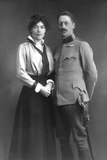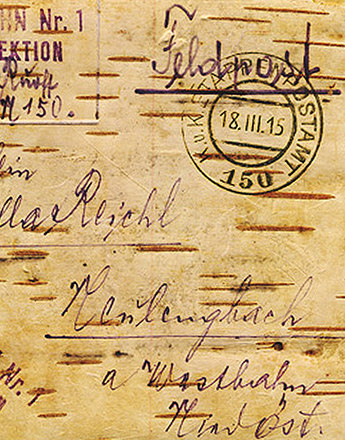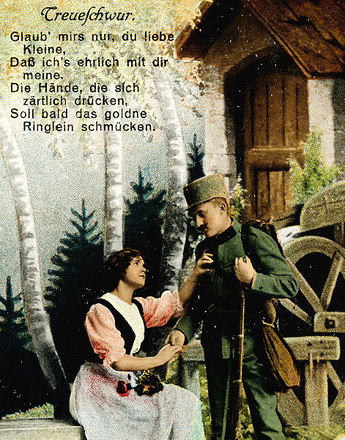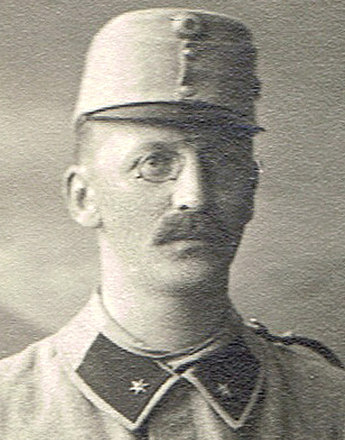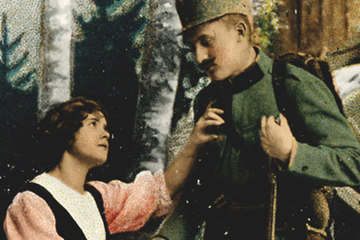Mathilde Hübner met Ottokar Hanzel at some point in 1904. Aged twenty at the time, she was preparing for the Maturitätsprüfung and took private tuition in mathematics and descriptive geometry from Ottokar Hanzel, who was training to be a secondary school teacher in these two subjects.
At Easter 1905 Ottokar Hanzel ‚declared his love’ to Mathilde Hübner ‚in a letter‘.
Shortly afterwards the two began to exchange letters about their relationship, recorded in a notebook entitled ‘Wir’ (We). This epistolary notebook opened up an intimate space for dialogue in which the young couple could exchange their thoughts about their feelings, their relationship and their future together.
By 1907 Mathilde Hübner and Ottokar Hanzel were thinking about marriage, but the death of Mathilde’s father and the deferral of Ottokar’s studies meant that these plans had to be shelved for the time being.
Ottokar Hanzel completed his teacher training in mathematics and descriptive geometry three years later in 1910, practising this profession until the outbreak of the First World War. Now that he had gained his degree and had the guarantee of an adequate income, nothing more stood in the way of the couple getting married.
On 2 March 1910 Mathilde Hübner, lower secondary school teacher and guest auditor at the Vienna Technische Universität, married her former private tutor Ottokar Hanzel. The couple’s first child, a daughter, was born in March 1911, to be followed by a second daughter in May 1914.
Once married, the couple moved into an apartment in Vienna’s twelfth municipal district, where Mathilde Hanzel lived with her two daughters throughout the war. She continued to work as a teacher, until the beginning of 1917 at the Feldmühlgasse Lower Secondary School in Vienna’s thirteenth municipal district, and after that as a supply teacher at a school on Steinbauergasse, which was very close to the family’s apartment. In July 1918 she was seconded to the girls’ lower secondary school at 27 Steinbauergasse, where she was given a permanent position.
Shortly before the birth of her second child Mathilde Hanzel resigned from the board of the Allgemeiner Österreichischer Frauenverein. She nonetheless continued to champion the cause of improving women’s opportunities for education and campaigned for peace initiatives from the outbreak of war, as attested by her letters.
Translation: Sophie Kidd
Bernold, Monika/Gehmacher, Johanna: Auto/Biographie und Frauenfrage. Tagebücher, Briefwechsel, Politische Schriften von Mathilde Hanzel-Hübner (1884-1970), Wien 2003
Rebhan-Glück, Ines: Liebe in Zeiten des Krieges. Die Feldpostkorrespondenz eines Wiener Ehepaares (1917/18), in: ÖGL (2012), 56/3, 231–246
Quotes:
„declared his love (...) in a letter”: Bernold, Monika/Gehmacher, Johanna: Auto/Biographie und Frauenfrage. Tagebücher, Briefwechsel, Politische Schriften von Mathilde Hanzel-Hübner (1884-1970), Wien 2003, CD-ROM, 103
„notebook entitled Wir“: Bernold, Monika/Gehmacher, Johanna: Auto/Biographie und Frauenfrage. Tagebücher, Briefwechsel, Politische Schriften von Mathilde Hanzel-Hübner (1884-1970), Wien 2003, CD-ROM, 103
Information about Mathilde Hanzel's places of residence and teaching as well as biographical data from: Bernold, Monika/Gehmacher, Johanna: Auto/Biographie und Frauenfrage. Tagebücher, Briefwechsel, Politische Schriften von Mathilde Hanzel-Hübner (1884-1970), Wien 2003, CD-ROM, 205
-
Chapters
- How does a collection of letters come to be stored in an archive?
- The protagonists: Mathilde Hübner and Ottokar Hanzel
- Love, marriage, career
- The separation begins
- ‘War fever’ versus the longing for peace
- Italy’s ‘betrayal’ in 1915
- ‘… surely this war must end some time?!’
- ‘… and tomorrow we will start cheerily canvassing for peace.’
- Black marketeering, profiteering and self-subsistence
- A love affair in wartime


